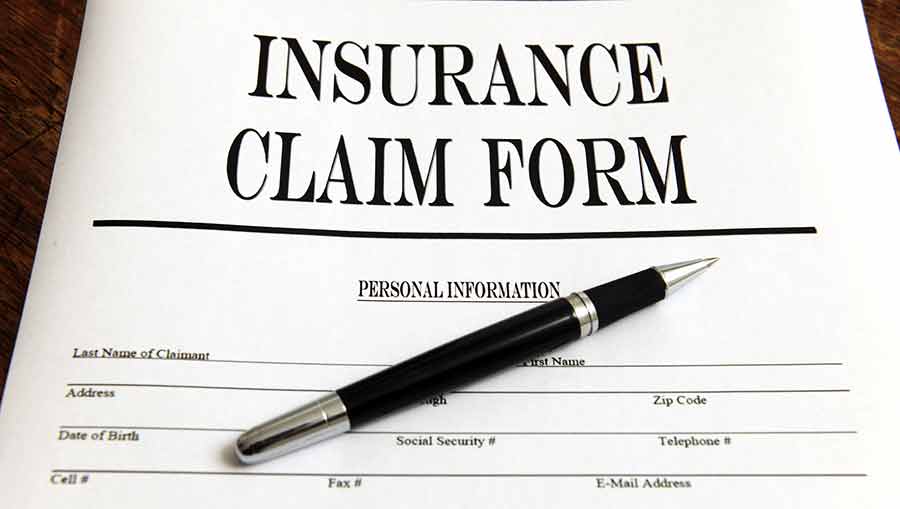Written by Andy Gurczak
September 16, 2021
Getting reimbursed for a covered incident isn’t as easy as simply filing a document. Insurance claims are a long and often complex process. Therefore, understanding it is your best shot at success. Public adjusters can be of great help since they are insurance claim professionals that work for the policyholder. Keep on reading to learn the most important homeowners insurance claim tips.
Homeowners insurance claim tips #1: First, know your home insurance policy
Your policy is the contract that binds you and your insurer. It outlines the details of your coverage. So understanding your policy and knowing what’s covered, what’s excluded, and the deductibles are crucial. If you don’t know how to decipher policy language, a public adjuster can help interpret it for free.
Homeowners insurance claim tips #2: If you think you have a case, file your claim as soon as possible.
Don’t let the bills or receipts pile up. Instead, after the damage, call your agent or your company’s claims hotline as promptly as you can. In fact, your policy might require that you make the notification within a certain time frame. Moreover, remember to file a police report, if necessary. If the damage resulted from a crime, report it to the police and ask for a copy of the police report. You’ll need this document when you make a claim with your insurance company.
Homeowners insurance claim tips #3: Fill out claims paperwork on time
Once you inform your insurer about the incident, they will send over forms for you to fill out. Your insurer will assign you an insurance adjuster to manage your case and confirm you meet any deadlines your policy outlines. Depending on the insurance company and the type of insurance claim, you might have to send in the following:
- Description of the loss and how it happened
- Second, an inventory of the lost or damaged personal property.
- Also, the specifications of the damaged structures
- Finally, receipts for additional living expenses if you can’t live in your house. As well as invoices for any temporary repairs you had done in order to mitigate damage
Remember, failing to comply with your provider’s requests can seriously harm and invalidate your payout. Make sure you read your policy carefully to understand your responsibilities so that you make the most out of your claim. If you’re unsure how to proceed, consider hiring a public insurance adjuster to help you.
Homeowners insurance claim tips #4: Make an itemized list for future insurance claims
As mentioned before, you’ll likely have to send in a list of your damaged property. For this reason, it’s essential to make an itemized list of your belongings before a disaster strikes. This list will serve as evidence that you owned the property in the first place, proof of its model and value. Therefore, the list should include:
- Anything you would need to replace after a covered incident.
- Prices for each item.
- The date you purchased the items.
- Receipts if you have them.
- Pictures of the items
In addition, keeping track of what you own and how much the items are worth can help you maintain your coverage up to date. It can also help you figure out if you need to purchase endorsements. For example, your insurance probably only covers a fraction of the cost of valuable items if you don’t have an endorsement to extend its coverage. In addition, insurance companies typically limit coverage for special items, such as jewelry or handguns. So if you have these items, consider getting extra coverage.
Homeowners insurance claim tips #5:If possible, document your interactions with the insurance adjuster
Once you’re assigned an insurance adjuster, you should make a point to start documenting your interactions. For instance, you could keep a journal or spreadsheet. In it, log the date and time of your conversations, along with a brief explanation of what was said. In addition, ask for paper or electronic copies of any reports or statements your adjuster makes.
Moreover, keep copies of all correspondence and write down information about your telephone and in-person contacts, including the name and title of the person you spoke with. Also, keep a record of your time and expenses since your insurer could compensate for it later on.
Homeowners insurance claim tips #6: Understand how to deal with insurance adjusters
Your insurer will assign you an insurance adjuster to evaluate your property damage and decide how much you’ll receive as a reimbursement when you file a claim. An adjuster’s priority is to minimize payouts for the insurance company. Therefore, dealing with an insurance adjuster can be tricky, and you should be careful about what you tell them.
Although it’s important to be honest on your insurance claim, you should never make statements that could be taken as an admission of guilt. The adjuster could use this information as evidence that your negligence was responsible for the damage, and you would receive no payment.
Remember, lying about your claim or concealing information counts as insurance fraud, consequently invalidating your claim and possibly resulting in legal penalties.
Homeowners insurance claim tips #7: Ask questions
Don’t be afraid to ask as many questions as you need to understand your claim. For instance, if there is a disagreement about the claim settlement, ask the company for the specific language in the policy that justifies. If you feel like you might be entitled to additional coverage, ask your insurance agent about it. Feel free to ask away.
Homeowners insurance claim tips #8: Make necessary repairs to mitigate the damage to your home.
In most cases, policies require you to make reasonable repairs after an incident to protect the property from future damage. For example, you may need to tarp up a hole in the ceiling to prevent water from coming in and ruining the undamaged items. If you need to hire a professional to help you professionally clean or repair the property, save the receipts so your insurer can reimburse you accordingly.
Keep in mind that if you don’t make reasonable repairs to minimize the loss, your insurer might deny further claims because you failed to maintain your property. However, don’t make any permanent repairs without the approval of your insurance company. Your insurer may deny a claim if you make permanent repairs before the damage is inspected. Also, avoid throwing out any damaged personal property until your claim is settled. Furthermore, take photographs or videos of the damage before making temporary repairs.
Homeowners insurance claim tips #9: Don’t rush into a settlement
If the first settlement offer made by your insurance company does not meet your expectations, be prepared to negotiate. If you have any questions regarding your settlement, seek a public adjuster to help you out.
Best way to beat the insurance company is to hire AllCity Adjusting
At AllCity Adjusting we help residential and commercial clients alike get the claims support they need. Moreover, we have over 50 years of combined experience helping get our clients the max settlement time and time again. If your claim has been low balled or denied entirely we can help increase your maximum settlement. Call us today for a FREE consultation. Experience the AllCity difference.
Real Support When You Need It!
Related Articles
7 Red Flags That Indicate You Need to Hire a Public Adjuster
If you own property, managing roofing insurance claims might seem tough. Knowing how to quickly deal with roof damage insurance claims from water, weather, fire, or unexpected events is helpful. In this guide, we’ll share useful tips to help you understand and work through roofing insurance claims more easily, aiming for a quicker solution.
Navigating Fire Damage Claims: What Every Property Owner Should Know
If you own property, managing roofing insurance claims might seem tough. Knowing how to quickly deal with roof damage insurance claims from water, weather, fire, or unexpected events is helpful. In this guide, we’ll share useful tips to help you understand and work through roofing insurance claims more easily, aiming for a quicker solution.
The Role of a Public Adjuster in Water Damage Claims
If you own property, managing roofing insurance claims might seem tough. Knowing how to quickly deal with roof damage insurance claims from water, weather, fire, or unexpected events is helpful. In this guide, we’ll share useful tips to help you understand and work through roofing insurance claims more easily, aiming for a quicker solution.
Understanding Water Damage Claims: A Comprehensive Guide for Homeowners
If you own property, managing roofing insurance claims might seem tough. Knowing how to quickly deal with roof damage insurance claims from water, weather, fire, or unexpected events is helpful. In this guide, we’ll share useful tips to help you understand and work through roofing insurance claims more easily, aiming for a quicker solution.
Essential Traits and Skills for a Successful Public Adjuster
If you own property, managing roofing insurance claims might seem tough. Knowing how to quickly deal with roof damage insurance claims from water, weather, fire, or unexpected events is helpful. In this guide, we’ll share useful tips to help you understand and work through roofing insurance claims more easily, aiming for a quicker solution.
Tips Expedite the Process :Commercial Roofing Insurance Claims
If you own property, managing roofing insurance claims might seem tough. Knowing how to quickly deal with roof damage insurance claims from water, weather, fire, or unexpected events is helpful. In this guide, we’ll share useful tips to help you understand and work through roofing insurance claims more easily, aiming for a quicker solution.
Stay Up to Date With The Latest News & Updates
Don't Wait - Get More
Get a free 1 hour consultation on your next call. So call today and challenge the insurance company narrative on your policy claim. We can help you with all your public adjuster claims support. Let us help you get more.
Join Our Newsletter
Do you want to learn more about public adjusting. In this newsletter we create helpful tips and hints and you will receive notifications when we post new articles.
Follow Us
Follow us on the following social networks.







Recent Comments